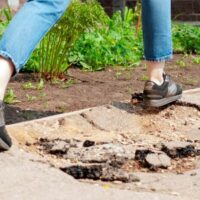Liability For Holes In The Ground

When we think of ways that we can be injured on someone else’s property, we often think about falls, or things falling on us. Perhaps you may think of attacks, or crime that would give rise to negligent security. Rarely do you think of holes in the ground, but actually, holes are not only incredibly dangerous, but Florida law has specific personal injury laws that address this kind of liability.
What Kind of Holes?
When we talk about falling into holes, we aren’t literally talking about a giant hole that your entire body falls into, although that can happen. Usually, we’re talking about the kind of holes in the ground that are big enough for your foot to go into while you are walking, but small enough that they may not be entirely visible to you.
Damages Can be Significant
Holes are serious business when it comes to injury. When you walk, you may not realize it, but your entire body braces for the impact of every step; your body and its muscles “expect” to get resistance where the ground is.
But when the ground isn’t there—when it’s a few inches lower than expected because of a hole—your legs, knees, ankles, or back expect to feel resistance from the ground, but it’s not there. By the time you realize that, your leg and foot are going deeper into the hole, and your musculature is not prepared to brace yourself from the impact of the (lower than expected) ground.
The result can be injuries that are absolutely devastating to your lower body and your back.
Why do Holes Exist?
There are a lot of reasons why holes may be in the ground. Sometimes, a bad sprinkler, dribbling water, can wear away, and erode, the soil in a given area. Landscapers may remove foliage from an area, but fail to fill in the hole left by the removed greenery. Construction sites may leave holes as they dig, move pipes, or do other work.
Asphalt and cement are not immune either. Often, areas can chip away, and if the chipping is significant enough, a “ditch” can form in the cement, creating a hole.
The Law of Holes in the Ground
The law makes it illegal to leave any holes in the ground that are wider, or deeper, than 2 feet. All holes must have fencing, or some kind of barrier, that would prevent someone from walking or stepping into the hole. Note that the law requires an actual barrier—not just a sign or other warning that the hole exists.
Unlike any other area of personal injury law, the law allows someone who is injured as a result of a hole, to recover twice their amount of damages. Your injuries, and damages will be multiplied by two, for holes in the ground when they injure you.
Defenses to Holes
It is still technically possible for a property owner to claim that a hole is open and obvious—the law doesn’t impose strict liability on property owners. But most holes are concealed, or in unexpected places, making this defense difficult for property owners to prove.
Contact the Miami personal injury attorneys at Velasquez & Associates P.A. today for help and a free consultation if you are injured on someone else’s property as a result of a fall of any kind.
Resource:
leg.state.fl.us/statutes/index.cfm?App_mode=Display_Statute&Search_String=&URL=0700-0799/0768/Sections/0768.10.html
